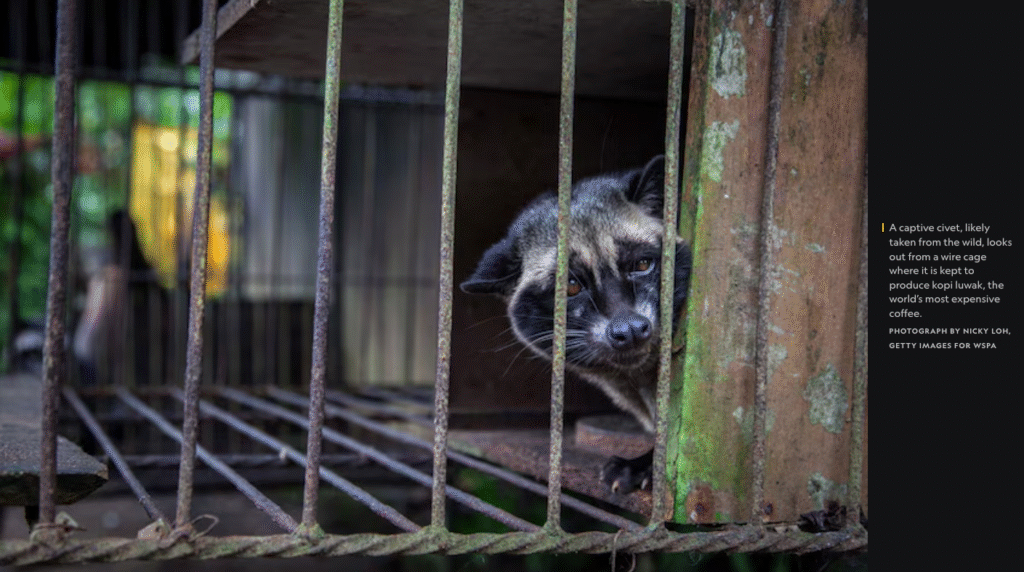As someone who has savored Indonesia’s vibrant coffee culture—from Bali’s lush plantations to Sumatra’s misty highlands—I’ve tasted some incredible brews. But there’s one coffee that tourists chase that I urge you to avoid: Kopi Luwak, or civet coffee. Marketed as the world’s most exclusive coffee, it’s made from beans digested and excreted by the Asian palm civet. While the idea might sound quirky, the reality is steeped in cruelty, illegality, and exploitation according to PETA. Here’s why you should skip Kopi Luwak on your Indonesian journey and opt for ethical alternatives instead.
The Hype: Why Travelers Seek Out Poop Coffee
Kopi Luwak’s allure lies in its rarity and unusual production process. Wild civets supposedly eat the ripest coffee cherries, and their digestive enzymes enhance the beans’ flavor, creating a smooth, earthy brew with chocolatey notes. Priced at $100–$600 per pound, it’s billed as a luxury experience, a bucket-list item for travelers seeking something exotic. Tourists flock to Bali’s roadside stalls or upscale cafes, drawn by the novelty and prestige of sipping “poop coffee.” The high cost, driven by labor-intensive collection and global demand, makes it a coveted souvenir.
But this glamour hides a grim truth. The coffee’s popularity has turned a once-rare practice into an industry rife with animal suffering and illegal practices.
The Cruel Reality: Civet Abuse Exposed

What was once collected from wild civets is now mass-produced on farms where these nocturnal mammals endure horrific conditions. Investigations by PETA and others reveal civets crammed into tiny wire cages, unable to move freely, surrounded by filth. They’re force-fed coffee cherries, leading to malnutrition, infections, and stress-induced behaviors like pacing or self-harm. Some farms even cage endangered species like binturongs, violating wildlife laws. These unsanitary conditions also raise risks of zoonotic diseases, potentially sparking health crises.
PETA’s undercover footage from Bali and Java shows civets with open wounds, languishing in cages, far from the “wild-sourced” myth peddled by sellers. Their campaigns have pushed retailers like Rich Exclusive Coffee and The East India Company to drop Kopi Luwak, but the industry persists, fueled by tourist demand.
Illegal Practices and Ecological Harm
In Indonesia, the heart of Kopi Luwak production, the coffee boom drives illegal activities. Civets are poached from the wild, threatening populations already hit by habitat loss. Caging and trading civets often violates Indonesia’s wildlife protection laws and sustainable development commitments. Some farms operate as “ghost facilities,” posing as legitimate while trafficking protected animals. The Sustainable Agriculture Network bans caged civet production on certified farms, but lax enforcement lets illegal operations thrive, fueled by the coffee’s exorbitant prices.
As travelers, buying Kopi Luwak supports this black market, contributing to biodiversity loss in a country renowned for its ecological richness. It’s a steep price to pay for a fleeting taste of luxury.
Ethical Alternatives for Conscious Travelers
Indonesia’s coffee scene shines without cruelty. Skip Kopi Luwak and explore single-origin beans from regions like Gayo Highlands or Toraja, grown by smallholder farmers. Look for Rainforest Alliance or Fair Trade certifications to ensure your coffee supports ethical practices. On my last trip, I savored pour-overs at local warungs that outshone any gimmicky brew.
By avoiding Kopi Luwak, you’re voting against animal suffering and illegal exploitation. Your travel choices can protect Indonesia’s wildlife and support farmers who prioritize ethics over profit. Instead of a costly cup of cruelty, bring home a bag of ethically sourced beans as a souvenir.




